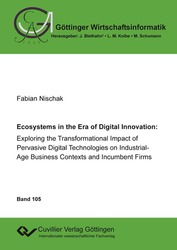| Areas | |
|---|---|
| Serie de libros (96) |
1381
|
| Nachhaltigkeit |
3
|
| Gesundheitswesen |
1
|
| Letra |
2370
|
| Medienwissenschaften | 16 |
| Teología | 57 |
| Filosofía | 102 |
| Derecho | 424 |
| Economía | 851 |
| Ciencias sociales | 418 |
| Ciencias del deporte | 48 |
| Psicología | 233 |
| Educación | 190 |
| Historia | 183 |
| Arte | 111 |
| Ciencias culturales | 166 |
| Literatur | 117 |
| Lingüística | 88 |
| Ciencias Naturales |
5408
|
| Ciencias Ingeniería |
1795
|
| General |
98
|
|
Leitlinien Unfallchirurgie
5. Auflage bestellen |
|
Erweiterte Suche
Ecoystems in the Era of Digital Innovation: Exploring the Transformational Impact of Pervasive Digital Technologies on Industrial-Age Business Contexts and Incumbent Firms (Volumen 105) (Tienda española)
Fabian Nischak (Autor)Matthias Schumann (Editor)
Previo
Lectura de prueba, PDF (830 KB)
Indice, PDF (81 KB)
The Internet’s emergence has significantly changed how people, communities, and societies behave, interact, and live. Today, people are accustomed to fulfilling their needs by taking advantage of giant online places for, e.g., the exchange of goods, video streaming, or social interaction. A driving force within this powerful development is represented by the growing diffusion of digital technologies. Enabled by technological advances, nearly every artifact is or can be equipped with digital technologies. With the increasing digitization and hybridization of physical objects established innovation and value commercialization logics are brought into question. Recapitulating today’s prominent players, such as Amazon, Facebook, Apple, etc., highlights the emergence of a new ecosystem philosophy in practice in which diverse third-party contributors are orchestrated via a digital platform and carefully considered in the core firms’ innovation activities. To shed light on this complex phenomena, this dissertation explores, first, the ecosystem concept and its particular relation to information systems, second, investigates the specific situation of industrial-age manufacturing contexts characterized by a physical core product that cannot be digitally substituted and, third, focusses on the specific nature of digital platform ecosystems to distill respective dimensions and characteristics.
| ISBN-13 (Impresion) | 9783736973282 |
| ISBN-13 (E-Book) | 9783736963283 |
| Formato | A5 |
| Idioma | Inglés |
| Numero de paginas | 212 |
| Laminacion de la cubierta | Brillante |
| Edicion | 1. |
| Serie | Göttinger Wirtschaftsinformatik |
| Volumen | 105 |
| Lugar de publicacion | Göttingen |
| Lugar de la disertacion | Göttingen |
| Fecha de publicacion | 02.12.2020 |
| Clasificacion simple | Tesis doctoral |
| Area |
Teoría de la empresa
|
| Palabras claves | Ökosystem, Ecosystem, Geschäftsökosystem, Business Ecosystem, Digitale Geschäftsökosystem, Digital Business Ecosystem, Ökosystem Evolution, Ecosystem Evolution, Innovationsökosystem, Innovation Ecosystem, Automobilökosystem, Automotive Ecosystem, Ökosystemphilosophie, Ecosystem Philosophy, Ökosystemperspektive, Ecosystem Perspective, Ökosystemmanagement, Ecosystem Management, Digitales Plattformökosystem, Digital Platform Ecosystem, Plattformökosystem, Platform Ecosystems, Plattformgeschäftsmodell, Platform Business Models, Digitale Plattform, Digital Platforms, Amazon, Facebook, Apple, Drittanbieter, Third-party Contributors, Komplementäre, Complementors, Informationssysteme, Information Systems, Durchdringende digitale Technologien, Pervasive Digital Technologies, Digitale Technologien, Digital Technologies, Digitale Innovation, Digital Innovation, Digitale Transformation, Digital Transformation, IdD, IoT, Internet der Dinge, Internet of Things, Geschäftsökologie, Business Ecology, Industriell-geprägte Firmen, Industrial-Age Firms, Industriell-geprägte Konzerne, Industrial-Age Incumbents, Industriell-geprägte Geschäftskontexte, Industrial-Age Business Contexts, Industriell-geprägte Produktionskontexte, Industrial-Age Manufacturing Contexts, Industriell-geprägte Ökosysteme, Industrial-Age Ecosystems, Digitale Strategie, Digital Strategy, Hybride Organizationen, Hybrid Organizations, Produkthybridisierung, Product Hybridization, Literatur Analyse, Literature Analysis, Taxonomie, Taxonomy, Archetypen, Archetypes, Muster, Patterns, Delphi, Netzwerkvisualisierung, Network Visualization, Unternehmensressourcenplanung, Enterprise Resource Planning, Dienstleistungsinnovation, service innovation, Innovationsprozess, Produktentwicklung, product development, Mobiltelefon, mobile phones, Wachstumschancen, E-Commerce, Industriezeitalter, Start-ups, Computernutzung, Laptop, Wirtschaft |








